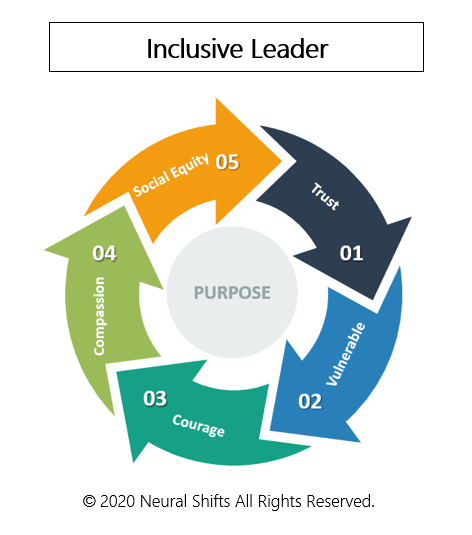As a leader, you are a sailor navigating uncharted territory. Perhaps, you are equipped with a large fleet of ships or a small boat. Nevertheless, you are experiencing extreme discomfort and looking for the sight of land on the horizon. You are frightened because your employees’ survival is at stake & stakeholders will judge your future ability to lead based on how you make decisions during this humanitarian crisis.

Don’t worry. You will weather this storm like you have many others. You’ve got this if you see it as an opportunity to build your capacity and develop new skills. Like any good sailor you most rely on your compass & if you lack one then this is the time to borrow from others while you can build your own. Let me share the elements of the compass the best leaders use to weather a storm.

During uncertain times, the noise-to-signal ratio is high, making it a critical moment to articulate with clarity your organizational ‘Why?’ & to lead with purpose. On March 13, in response to the rapid spread of the Coronavirus and without government intervention, Patagonia ordered its employees to work from home and shut down all its retail operations to prevent human loss. I am sure this was not an easy decision for leadership to make, but instead a very painful one knowing the severe economic impact on profits. Nevertheless, it was made because Patagonia has a clear purpose to save the planet and improve lives. They know lives will not be improved if they are placed at risk.
To override your fear of profit loss, ensure your purpose is bigger than your pain.
Microsoft and others have followed in Patagonia’s footsteps, offering mental health resources to help employees cope with the stress and get pay while on standby. If your purpose has become momentarily irrelevant, redeploy your unique capabilities to meet society’s urgent needs. Follow the example of this mattress store owner who now creates masks to fight coronavirus or learn how Ford is partnering with other manufactures to produce medical supplies.
The best managers know that their success lies in fostering relationships with their employees. At all times and especially in a crisis, first, they extend trust, because high trust is the foundation of effective relationships.
If in the past you have not allowed your employees to work from home because you didn’t trust they will get the job done, this is your first step to demonstrate trust and immediately equip employees with the tools to work from home. It will be a quick way to innovate & create new social norms that drive virtual collaboration and inclusive meeting behavior. In globally dispersed teams, we have seen that the consistent use of webcam technology and assisted virtual technology enables not just remote employees to feel more connected but also visually impaired employees to fully participate in the meetings, raising the organization’s productivity.
It seems counterintuitive to spend time building trust with your employees right now, but trust is only built with consistency over time. Take the opportunity to create emotional connections, allowing brief chit-chat during your virtual meetings. Ask managers to conduct daily check-ins to learn how people are mentally coping with the challenges & offer support.
We are unfortunately seeing that in societies with low trust, like Colombia, employers are sending their employees on obligatory “vacations” with nothing to do, instead of enabling telecommute options. In this way, they further damage their bottom line and corrode the trust employees have in their leadership’s ability to survive the storm.
Second, be vulnerable and bring your whole self to work. Now that most people are working from home, resist the urge to look like you have a perfect living situation. If your family or pets show up to your team meeting, don’t stop the webcam and instead use humor to acknowledge that you are balancing life and work as everyone else on your team. It is also ok to say, I don’t have all the answers but I’m working hard to make the best decisions for all of us. In this way, you will generate trust and respect as others see that you are a human trying your best to steer the ship in the right direction.
Vulnerability is the catalyst for developing high trust.
Third, demonstrate courage to make the decisions that may challenge the status quo, like putting people over profits. Although you may be feeling like sticking your head in the sand and staying silent, know that doing so will profoundly destroy the morale and psychological safety of your team. It is normal to feel anxious or frightened during this time but how you frame the situation will motivate or paralyze your workforce. Find ways to create a wave of courage among your team members to support each other.
Brené Brown says, “courage is contagious, every time we are courageous, we make the world a little better.”
An employee may be courageous by telling you that they are losing it or by simply working overtime with customers. Responding with gratitude and offering your support will strengthen your relationship.
You may not have the luxury to avoid layoffs, but remember that the employee experience continues until the day you exit them. Fourth, exercise compassion towards your employees, acknowledging their situation, and be mindful of the language you use when communicating. If you have to communicate layoffs, add some human touch to the standard legal verbiage to show that you care. As a direct manager say, “I’m deeply grateful for your contribution and apologize for the negative impact our decision may have on your family life. I am happy to connect you within my network for opportunities and provide excellent references for you. This will allow the leaving employees to know that you have their back & let those who stay know that you will treat them with respect. After the layoffs, your whole organization will be grieving. You must provide employees with resources and space to share their thoughts and feelings about the departed.
Fifth, strive toward social equity. Your front-line employees from underrepresented groups are more likely to suffer greatly during these uncertain times because of systemic barriers. They may not have access to capital to cover their living expenses. If you re-distribute funds, think about ways to mitigate their socio-economic impact. Also, acknowledge that Asian employees may be experiencing greater amounts of stress due to xenophobic acts committed in the last few weeks and offer your support. Be an ally and publicly declare that xenophobic humor or language will not be tolerated to send a clear signal that inclusion matters.
Finally, no leadership book you read or course will enable you to become skillful in time to tackle this challenge. Be kind to yourself and practice self-compassion. Keep in mind that your employees are grieving the vast human loss and you will need to adjust performance expectations accordingly. Rely on the following skills to get you through the crisis.
- Coaching to help employees’ reframe issues & lift their spirits.
- Emotional self-regulation to act calm under pressure.
- Open communication to lead with transparency & purpose.
Don’t forget consumers now have an elevated social conscience and will care about how you have treated your employees during the pandemic. So, as you calibrate your compass to survive the storm, place organizational purpose at the heart of your business model & keep building your leadership capacity.


